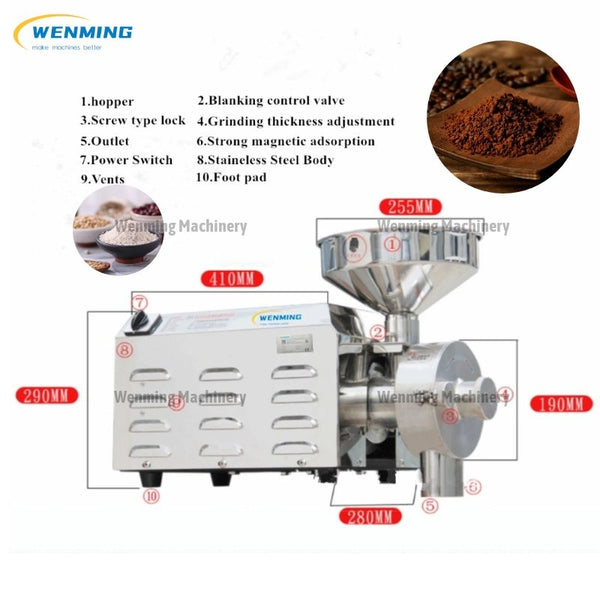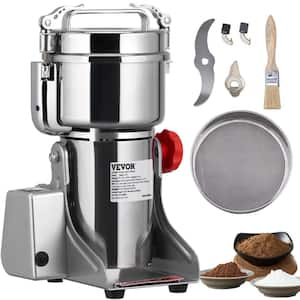Industrial Coffee Grinder vs. Personal Grinder: Main Differences Detailed
Industrial Coffee Grinder vs. Personal Grinder: Main Differences Detailed
Blog Article
Leading Attributes to Seek in an Industrial Coffee Grinder
When evaluating an industrial coffee mill, it is essential to identify crucial features that influence both efficiency and long life. Uniformity in grind size is important for optimal extraction, while flexible grinding speed allows for an equilibrium between effectiveness and high quality.
Grind Dimension Consistency
While different variables can affect the high quality of made coffee, grind dimension consistency continues to be extremely important in attaining optimum extraction. The harmony of coffee grounds directly affects the brewing procedure, as irregular fragment dimensions can cause over-extraction or under-extraction. This disparity results in imbalanced flavors, where particular notes might be overpowering while others are muted.
Industrial coffee mills are developed to offer a high level of precision, typically employing burr grinding devices to ensure an uniform grind size. Unlike blade grinders, which can produce a mix of fine and crude bits, burr mills squash the beans between two surfaces, enabling far better control over work size. This uniformity is vital throughout various developing approaches, whether coffee, French press, or pour-over, as each strategy calls for specific work dimensions for optimal flavor extraction.
Additionally, uniformity in work size adds to the total efficiency of the developing process. A consistent work enables even water flow, reducing the risk of funneling and improving extraction performance. In recap, purchasing a commercial coffee grinder with an emphasis on work dimension uniformity is vital for accomplishing high-quality coffee with desirable flavor accounts.
Grinding Rate
Grinding rate plays a crucial function in the total performance of commercial coffee mills, directly affecting both the high quality of the work and the efficiency of the procedure. Industrial Coffee Grinder. Greater grinding rates can substantially improve the throughput, making it feasible to refine bigger quantities of coffee beans in a shorter period. This is especially essential for services that count on high-volume production, such as coffee roasteries and coffee shops
Nevertheless, while speed is essential, it is equally important to stabilize it with the high quality of the work. Exceedingly high grinding rates can produce warm, which might adversely impact the taste account of the coffee by causing the beans to lose crucial oils and fragrances. Consequently, a grinder that uses flexible rate setups can supply optimal adaptability, permitting drivers to customize the grinding procedure according to particular requirements.
Additionally, the grinding speed should correspond to guarantee harmony in the work dimension, additional contributing to the general preference and brewing top quality of the coffee. In recap, examining grinding rate is vital for picking a commercial coffee mill that satisfies both performance and top quality needs.
Build Quality and Resilience
The efficiency of a commercial coffee grinder is not only identified by its grinding speed; build quality and resilience are similarly important factors that influence long-lasting performance and dependability. A sound grinder will endure the rigors of everyday usage, making it a sound investment for any business procedure.

Sturdiness additionally reaches the mill's electric motor and internal devices. Industrial coffee mills ought to be equipped with durable electric motors with the ability of maintaining prolonged procedure without overheating. In addition, durable burrs are crucial, as they straight affect the high quality of the grind and contribute to the total durability of the machine.

Ease of Usage and Maintenance
Continually prioritizing convenience of use and upkeep can dramatically boost the operational effectiveness of an industrial coffee mill. Easy to use features such as user-friendly controls and clear labeling are essential for decreasing downtime and click for source making sure that operators can promptly adjust to the equipment. An ergonomic design, including height-adjustable receptacles and available grinding chambers, permits comfortable procedure and facilitates the loading and dumping of coffee beans.
Additionally, convenience of upkeep is crucial for lengthening the lifespan of the mill. Equipment with removable parts and parts created for quick cleaning can simplify maintenance jobs, decreasing the time invested in regular maintenance - Industrial Coffee Grinder. Look for grinders that integrate self-cleaning devices or require minimal disassembly, as these functions can save useful labor hours
Additionally, clear maintenance routines and documentation are crucial. i thought about this Grinders that feature thorough user manuals describing maintenance treatments can aid operators stick to best techniques, guaranteeing consistent efficiency and quality. By buying a commercial coffee mill that highlights simplicity of use and upkeep, companies can boost productivity, minimize operational costs, and maintain the high standards expected in coffee manufacturing.


Sound Level Decrease
When selecting a commercial coffee mill, noise level reduction is an important element that can considerably influence the workplace. High sound degrees can bring about staff member tiredness, reduced focus, and potential hearing damages over time, making it essential to select a mill developed with sound-dampening features.
Seek mills that include sophisticated noise-reduction technologies, such as sound-insulated real estates and vibration-dampening mounts. These functions assist to decrease operational sounds, producing a quieter atmosphere for productivity. Industrial Coffee Grinder. In addition, selecting grinders equipped with low-noise electric motors can further improve sound reduction, guaranteeing a more enjoyable workplace
Think about the mill's overall layout. The positioning of the mill within the work area need to be strategic.
Inevitably, buying a coffee grinder that focuses on noise decrease not just improves the convenience of staff members yet also lines up with a dedication to keeping a risk-free and productive job environment. This attention to information can lead to enhanced worker satisfaction and retention.
Conclusion
In summary, choosing a commercial coffee mill demands careful factor to consider of numerous key attributes. Grind size uniformity is crucial for optimal removal, while adjustable grinding rate helps with an equilibrium in between throughput and top quality.
Industrial coffee mills are made to provide a high degree of accuracy, typically employing burr grinding mechanisms to make certain a consistent work dimension. Unlike blade mills, which can produce a mix of fine and crude bits, burr mills crush the beans in between 2 surfaces, permitting for much better control over work size. In recap, spending in an industrial Read Full Report coffee grinder with a focus on work size consistency is necessary for attaining top quality coffee with desirable taste accounts.
Grinding speed plays a vital duty in the general performance of commercial coffee grinders, directly influencing both the quality of the grind and the performance of the procedure. A mill that provides flexible rate setups can offer ideal adaptability, enabling drivers to customize the grinding procedure according to certain demands.
Report this page